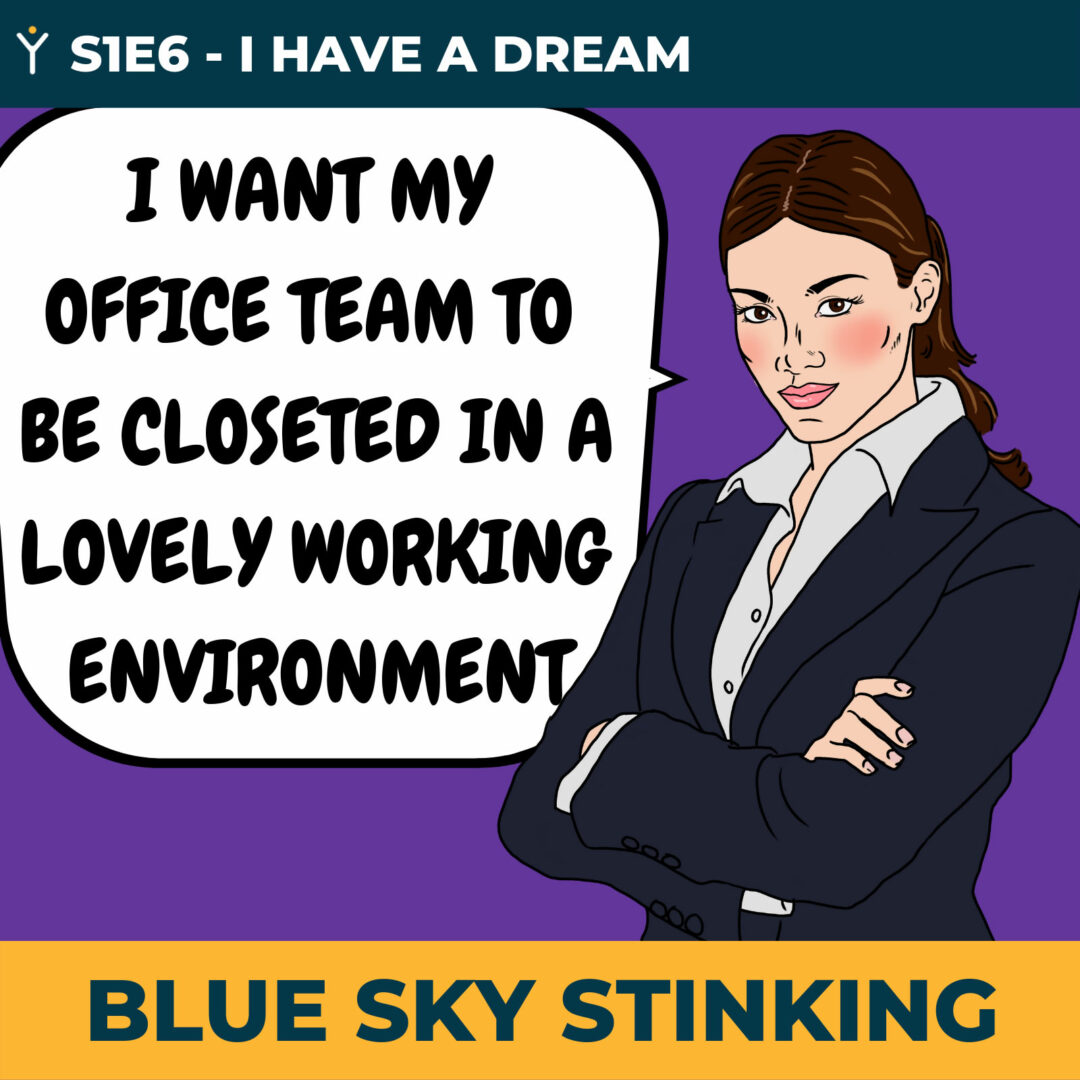
Timings
- 00:18 - Scene 6.1 - Building a Better Building
- 07:19 - Discussion with Dave Moore
- 08:57 - The role of an architect
- 09:30 - The role of a project manager
- 09:57 - The expectations of the client
- 10:40 - The role of a builder
- 11:02 - Change Control
- 12:35 - Others that should be involved
- 14:20 - Health and Safety
- 16:33 - Learning from Mistakes
- 17:40 - Top tips for creating useful, safe and effective premises
- 18:50 - What's next?
Useful Information
Setting up and running Business Premises (@07:19)
Architects and Project Managers (@08:57)
Health and Safety (@14:20)
Top tips for creating useful, safe and effective premises (@17:40)
- Tip #1 - Listen to advice
- Tip #2 - Listen to the client
- Tip #3 - Work together to find the solution
Episode script
CONTINUITY: Finally, Jakob and Zelda meet in their new premises where renovation and beautification works are well underway.
(Builders and fitters working in the background)
ZELDA: Morning Buttercup!
JAKOB: What? (Bit deflated it wasn’t a term of endearment) Oh, right… The hi-vis gear… Haha! . How the progress? It’s looking good
ZELDA: I know, right! I think the builders hate me, but we’re getting there.
JAKOB: I can’t imagine anyone hating you Zelda. And don’t you look dapper in your hi-vis vest and hard hat… So, where are the offices located?
ZELDA: Through here
JAKOB: Wow! Thats a big open, empty, echoey office. Bit chilly too, you keeping the heating off to save money?
ZELDA: It’s the same temperature as the warehouse?!
JAKOB: Yes, but thats expected. Warehouse workers tend to be dressed for the job. Office workers… Well… Not so much. You going to work in your coat?
ZELDA: I guess not. The builders said something about heating… Hold on (Shouting through to the foreman). Yo, Wilson, What did you say about the heating yesterday
WILSON: (Shouting back) What I said was, if you force us to put that wall there it will disable the heating
ZELDA: Yeah, that was it. Hold on (shouting back) Do you mean permanently or just whilst you put it up.
WILSON: (shouting in reply) Permanently, you know, when I said, “You won’t have any heating if you put that there”
ZELDA: Oh!
JAKOB: (to Zelda) That’s not good (shouting to Wilson) What will it take to reinstate the heating?
WILSON: Dunno, we had to rip the flue out – I know a guy, but it won’t be cheap
JAKOB: I bet – get me a price and we’ll have to get it done
WILSON: Righty ho buddy (almost audibly rolling his eyes)
JAKOB: We need to think about the practicalities of running a building and not just getting the aesthetics right.
ZELDA: Aesthetics?
JAKOB: You know, look and feel, making it look beautiful, that kind of stuff
ZELDA: But dads office always looked like it was in a factory, I want my office team to be closeted in a lovely working environment. I believe that will make them more productive
JAKOB: Not if they’re frozen to death they won’t.
ZELDA: (thinking) True, definitely less productive when dead…
JAKOB: I am surprised Tarquin let you do it, I’ll have to have a chat with him.
ZELDA: Tarquin! That jackass. He stomped on just about every great idea I had
JAKOB: Stomped? That sounds past tense
ZELDA: I told him to naff off – called himself an architect, the only thing he architected was my misery
JAKOB: But he’s the best commercial architect in the area. (worried) Please tell me you didn’t insult him?
ZELDA: Of course not. I told him honestly that he was useless to me and didn’t know what he was talking about and that I would take control of the project
JAKOB: So you canned his project manager at the same time
ZELDA: Sure! They were ganging up on me. (Mocking) “You can’t put that wall there”, “If you block that door up it’s a fire risk”, “Electrical sockets can’t…”
JAKOB: (interrupting) What door have you blocked up?
ZELDA: Over there (pointing)
JAKOB: Hold on, that the entrance for the office workers… and their fire exit!
ZELDA: They can go in and out of the warehouse
JAKOB: But what if the fire is in the warehouse
ZELDA: Oh… Out the Windows?
JAKOB: Look, I appreciate you want the office to be attractive and pleasing to work in, but it has to be functional and safe. There is balance to be struck. I admit, sometimes you have to ‘manage’ architects, but they, especially Tarquin, know what is appropriate, safe and legal. Let me smooth it out with him and get the place up to code.
ZELDA: Oh ok, I thought he was being picky, self opinionated and overly-cautious. But you’re paying for it, so whatever you think is best
JAKOB: (under breath) Yes, yes I am paying for it!
ZELDA: What?
JAKOB: So, interviews starting next week I hear, everything planned?
ZELDA: Yep, I’ve got lots of interest from the local job centre and I posted jobs on jobs sites. Also got some friends popping in to the Dog and Bone for a chat on Friday, so may get some luck there.
JAKOB: Ok, but be careful with hiring friends and family
ZELDA: Yeah, Yeah, whatever – dad did well with me…
JAKOB: Who’s doing the interviews with you?
ZELDA: I haven’t got anybody lined up, do I need to?
JAKOB: I’ll get Katherine to join you, think you could do with some help. It’s quite tough to do back to back interviews.
ZELDA: Ok, will be nice to see Kat… Katherine again.
JAKOB: And, of course, when they start have you got the desks and IT all sorted out
ZELDA: I’m going to hire a facilities manager and IT techies so they can deal with that.
JAKOB: So you’re going to wait for them to work their notice at their current job, start with you and then you’ll start installing desks, seating and the technology
ZELDA: Well now you say it like that, it sounds a bit sluggish
JAKOB: T..T..Tarquin has an office design specialist in his team, let’s get them in. I also know a good IT company who should be able sort out the network, computers, printers, and … (Looking around) Cable-ing…(still looking) Where’s the dado trunking that was in here?… I’m sure it was marked on the plans
ZELDA: (bit arty) It broke up the walls and made the place look too industrial
JAKOB: (stunned silence) I…I…I… Know… A good IT company… Thankfully. Tell you what, let’s talk about what you want the office to look like and I’ll take control of this so you can focus on hiring the people… Deal?
ZELDA: Great! I’m fairly happy with the start I’ve made here it will be great to move onto the next challenge
JAKOB: Yes, yes, that would be good.
Setting Up Premises Discussion Transcript
RUSSELL: Where do you start with all that? Well, firstly I’d like to introduce Dave Moore from the Cornwall Development Company who’s joined me today in the Enterprise Space for Advanced Manufacturing in Cornwall. Welcome Dave…
DAVE: Hi
RUSSELL: Dave, you have many years in running premises like the one’s Zelda is trying to setup. You are currently the Center Manager for this lovely, brand new, building on the outskirts of St Austell. Could you tell us a little bit more about yourself…
DAVE: Well, you know. 20-30 years experience in engineering, maintenance, project delivery and building management. Guess that sums it up really.
RUSSELL: Cool! So, on that basis, we’re going to have a look back on what you’ve just heard about Sydeline’s new premises. What are your initial thoughts on what is going on there?
DAVE: Where do you start! Poor communication. Lack of understanding. No clear control. Guess that’s a start, I suppose.
RUSSELL: It does seem to be that the client’s taking a heavy role in this. Is that unusual?
DAVE: Nope!
RUSSELL: You don’t usually get someone like the client, like Zelda, standing on the side telling the architect what to do
DAVE: Very often you do
RUSSELL: You’re not couching your answers with caution in there are you?
DAVE: Definitely not
RUSSELL: I think it would be good to cover some more of the points in detail: Let’s talk about the role of an architect in any building or renovation project like this one. Are they critical, could be useful. Are they there to be truly useful or are they just an optional expense?
DAVE: Simple projects, possibly not. They do understand building dynamics and the requirements and principles of design. Though sometimes they do forget that they’re there to deliver what the client wants rather than award winning buildings that might bring them more work in the future.
RUSSELL: Yeah, I can see that. What about a project manager? Because she managed to can both the architect and the project manager. Project managers, again, optional?
DAVE: He should help to manage the delivery of the project, ensuring it meets the clients needs. Co-ordinating and managing the actual deliver. Hence “project manager”. But sometimes they can take one side or the other, very often. A good project manager will normally seek a good workable compromise in most circumstances.
RUSSELL: What should Zelda, as the client, be expecting from these experts, in the form of architect and project management?
DAVE: She should be expecting advice from these experts in order to deliver her dream. However, communications, listening and understanding in both directions is critical.
RUSSELL: Do you think she’s trying to get too involved in the project?
DAVE: Yes and no. Cause she know’s what she wants, but she does need to listen to the advice she’s given.
RUSSELL: So there’s a good chance that Tarquin, our famous architect, probably stuck his heals in, perhaps not dealt with the client as he should
DAVE: I would think so.
RUSSELL: OK, the builders, maybe a bit stereotypical there, but was their approach familiar or are you surprised they decommissioned the heating?
DAVE: No surprised at all, very familiar. They’ll do what you ask them to do. Sometimes to a point.
RUSSELL: So, at that point ripping the flue out! Now Zelda has been deviating somewhat from the plans, therefore. Quite evidently, she’s taken walls down and put them up where she shouldn’t do. The architect had put these plans together – what would be a good process for managing these changes normally? Shouting them through the corridor to the building manager?
DAVE: Project meetings, discussions, agreements, change control. Any one of a number of things along those lines. But make sure things are tracked so people know what they are doing and why they are doing them. Rather than just listening to somebody and doing something without thinking about the consequences.
RUSSELL: Just drilling into that slightly, change control is one of those phrases at which people wince. It’s like project management, people don’t like it. For a small business owner or a start-up who think that a project manager is just an unnecessary expense, and an architect definitely think so. And then you hear, change control – what does it protect you from?
DAVE: It protects you from you builder ripping your flue out without explaining to you why you can have any heating after that? It’s really to create an understanding, make sure everyone’s aware of the decision that’s being made and why.
RUSSELL: And also the documentation pathways means that, when you do actually, finally get to an operational building, you can go back
DAVE: It also means if you do want to look back you can see why a change was made and why you’ve ended up where you’ve ended up
RUSSELL: And hopefully that can help with the route to any dispute resolution
DAVE: True
RUSSELL: Now, it has to be said, that sometimes, the architects can not think of everything. Who else is it good to get involved when you’re designing premises
DAVE: I say definitely the M & E guys, or the Mechanical and Electrical teams. After all, without power and water, how do you make a cup of tea! Other’s though might be IT or perhaps some other specialists like heating and ventilation specialist. Or maybe office planners, like Jakob suggested.
RUSSELL: Focusing on the M&E, it’s obviously a phrase which is very familiar to us but to people who are running a premise for the first time, M&E includes power and water but can also include some quite bulky pieces of equipment
DAVE: So, it could include your fire alarms or your intruder alarms so you can lock the building up when you’re going home and you know you now going to get anything stolen. Even down to your boilers, else you can’t get your heat and you certainly can’t boil your kettle without your services, or even without your IT.
RUSSELL: It’s possible that people under-estimate the amount of space that some of this stuff needs to take
DAVE: So often I’ve seen buildings where they’ll put a plant room in and then, when they start building it, they discover they can’t get everything in the plant room and they have to find somewhere to put the water tank. I can think of an example of just seen the last couple of weeks, where they’ve ended up having to put the water tank somewhere which has created a load more work, because they’ve had to fence an area off and reduce the working area that was available to the client
RUSSELL: And that can also impact if you do want to extend, change, go up with new floors or different things. Suddenly, you can’t because you got this large piece of engineering equipment in the way. Ok! So moving on a bit, to what is a huge subject, and I’m not looking for chapter and verse on this by any stretch of the imagination. Health and Safety – where do we start? Staff safety over staff comfort?
DAVE: It’s a difficult one. I think it’s good old common sense. Unfortunately, no one seems to teach common sense anymore. Ultimately, if it don’t seem safe it probably isn’t. Actually, remember, if you’ve been doing it the same way a thousand times and got away with it, it just means you’re closer to get it wrong and something happening that shouldn’t. Ultimately, there are rules and guidelines for a reason. I think common sense helps but for some reason we’ve had to write them down because people don’t apply common sense. So that’s why the rules and guidelines are there.
RUSSELL: And they can sometime appear to be a bit over-bearing or complex. Especially when you’re starting up new premises, there can be an absolute wall of Health and Safety, fire risk and such like and you have to wade through all of that
DAVE: Correct
RUSSELL: So it goes back to some of things we’ve said in previous episodes. Getting advice on these subjects early and even if that’s talking to other people that are running similar premises
DAVE: I think it’s the same all round really. The earlier those conversations take place the better. And sometimes we go away and we let somebody design something. They don’t involved the M&E and so you end up with a plant room that’s not big enough. You don’t involve the client and the client comes along and says well that’s why I want to move that wall because you didn’t give me a big enough office.
RUSSELL: And then you get into expensive change
DAVE: Correct
RUSSELL: So, you’d have to say, with Health and Safety that blocking fire doors is an absolute no-no then?
DAVE: Yeah! But you might have been able to move it
RUSSELL: Yes, as you say, it’s about using some common sense. She didn’t use her common sense, but was just looking at the attractiveness of the room. Moving on and passing over recruitment because that’s a subject for another day. Moving on to the fact that Zelda had decided to remove the dado trunking and cabling around the room. I once saw a company strip out all physical dado rail data cabling because it ruined the look of the room, just because they’d heard that wi-fi could replace it all. That was 10 year or so ago, and of course wifi just couldn’t that – bit different now. Have you seen any hideous mistakes you can share without embarrassing anyone?
DAVE: I remember once, a company specifying a new boiler for a site based on the incoming gas usage to the site. Unfortunately they’d forgotten that there were actually 4 kitchens on that gas supply. So they ended up with a very big, over-sized boiler that very rarely ran, and when it did run, it was at such a low level that it was incredibly inefficient. Classic example
RUSSELL:: So, expensive on all sides there
DAVE: And wasteful too
RUSSELL: There is an array of these things and by suffering you can help others to avoid them. Finally, it would be good if you could share your top tips for creating safe, useful and effective premises.
DAVE: I think, listen to the advice, listen to the client and work together to find the solution
RUSSELL: Well that’s concise and thank you very much for those for those. And it has to be said that building premises leads to commissioning premises and managing premises all with their own challenges. Would you agree?
DAVE: Sure does, and that’s not to mention snagging and defects when you’re trying to move in
RUSSELL: And I think that’s common. We’re sitting in a brand new building and we’ve both experienced small snags. And, not seeking to embarrass anybody, it is just what happens, you can’t get away from that.
DAVE: No
RUSSELL: Well that’s great, thanks very much for spending the time with us there. Thanks Dave and thanks for Cornwall Development Company giving you the chance to do this
DAVE: My pleasure
RUSSELL: So at that point I’d encourage all of you listening to ask questions in the comments on our show page where we’ll put useful links and a full transcript of our conversation. You could also leave your feedback and ideas for subjects to cover in the future and rate, like and share if you would be so kind.
As for next time, well you heard Jakob say that recruitment is about to kick off in Sydeline – that’s got to be easy, hasn’t it. We’ll have 1, or possibly even 2, recruitment and HR experts to throw some light on the matters raised in the next Episode, which is called “One Of Us”.
Say goodbye Dave
DAVE: Goodbye Dave!
with special thanks to...
David Moore is Building Manager for the Enterprise Space for Advanced Manufacturing (eSAM) in Carluddon Technology Park just outside St Austell in Cornwall. Working for the Cornwall Development Company, Dave has a wealth of experience in project and facilities management.









